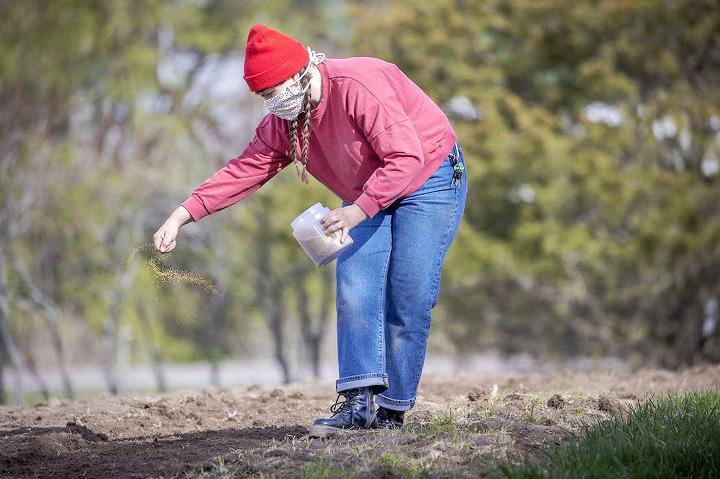 |
Canku Ota
|
 |
|
(Many Paths)
|
||
|
An Online Newsletter
Celebrating Native America
|
||
|
June 2020 - Volume 18
Number 6
|
||
|
|
||
|
Minneapolis Nonprofit
Grows Culturally Specific Food For American Indian Communities
|
||
|
by Kelly Smith - Minneapolis
Star-Tribune
|
||
On a barren cornfield in Hugo, crews are transforming the land with ambitious plans. After clearing invasive buckthorn trees, they will restore the sandy, clay soil and plant trees and a meadow to house birds and insects while boosting the amount of healthy, culturally specific food for American Indians in the Twin Cities. "We're trying to turn the clock back on the soil," said Jessika Greendeer, the farm manager. "It's going to take some time." The need for additional land was critical," said Neely Snyder, executive director of the nonprofit. "It just feels like, now more than ever, there's a need for food." More than seven tons of fruit and vegetables grown each year at the nonprofit's original 10-acre organic farm and orchard in Hugo, 30 miles northeast of Minneapolis, are distributed through youth programs, farmers markets, a CSA, sold wholesale to Indian chefs and restaurants, and donated to food shelves. The nonprofit's work is part of a broader movement in Minnesota's American Indian community to combat health issues and promote healthy indigenous foods and food sovereignty, reclaiming a traditional way of life and relationship with the land.
Many of the state's 11 tribes — seven Anishinaabe or Ojibwe and four Dakota or Sioux — are in "food deserts," areas with limited access to grocery stores. American Indians also face higher rates of health issues such as diabetes and obesity — disparities widening during the COVID-19 pandemic. As a result, tribes, nonprofits, and foundations across the state are adding emergency COVID efforts, distributing more food and resources to American Indians in need as unemployment rises and casinos — major tribal employers and sources of tribal revenue — stay closed during the pandemic. Grants from a $11 million Minnesota Disaster Recovery Fund backed by foundations have supported the Lower Sioux Indian Community, Fond du Lac Band of Lake Superior Chippewa, and White Earth Reservation Housing Authority. In St. Paul, a $12,000 grant from the Minneapolis Foundation is helping Interfaith Action of Greater St. Paul bolster its culturally specific food shelf for American Indians in the east metro. The food shelf, which costs $15,000 a month to maintain, is seeing demand skyrocket by 200%, with all food distributed within two days each week, said Randi Ilyse Roth, the nonprofit's executive director. "There's tremendous need," she added. Dream of Wild Health received a grant from the Headwaters Foundation for Justice's new fund to boost support during the outbreak. Dream of Wild Health is also partnering with the Minneapolis American Indian Center to provide food for 100 free meals a day delivered to elders during the pandemic — from venison tacos to rabbit stew and fresh salad. The program is backed by a grant from the Blue Cross and Blue Shield of Minnesota Foundation, which has also given grants for emergency food distribution to the Leech Lake Band of Ojibwe, Lower Sioux Indian Community, and Northwest Indian Community Development Center. Garlic, lettuce, and carrots will sprout this month on Dream of Wild Health's Hugo farm as crews begin the work of restoring the new 20-acre site nearby, reworking 2 acres at a time. "People don't realize the importance of connecting with the earth … it's healing," Snyder said. Dream of Wild Health bought the new land, which has no electricity or water source, for $240,000 this year. But it will cost much more than that to revamp the land, install irrigation, plant hundreds of trees, add a hoop house and greenhouse to extend growing year-round, and continue to grow traditional plants — from corn to squash — without fertilizer or any pesticides. The small nonprofit, which is fund-raising for the project, started more than two decades ago with leased land in Farmington before buying the Hugo property in 2004. Now, the nonprofit has 16 employees, nearly 100 volunteers, and an $800,000 annual budget — the bulk of which is supported by foundations and donors. A $50,000 grant during Minnesota's Super Bowl in 2018, funded by the Shakopee Mdewakanton Sioux Community, helped fund a new kitchen for cooking classes. Due to COVID-19, volunteer events are canceled or postponed, while workshops, such as one on sacred medicines, recently have moved online. But crews are moving ahead on work at the new 20-acre site, which will allow the nonprofit to grow more fruits and vegetables and regenerate more ancient indigenous seeds. "They're a priceless gift from our ancestors," Greendeer said. "It's all about getting back to the roots of our ancestors."
Dream
of Wild Health |
||||
|
|
|
|
||
|
|
||
| Canku Ota is a free Newsletter celebrating Native America, its traditions and accomplishments . We do not provide subscriber or visitor names to anyone. Some articles presented in Canku Ota may contain copyright material. We have received appropriate permissions for republishing any articles. Material appearing here is distributed without profit or monetary gain to those who have expressed an interest. This is in accordance with Title 17 U.S.C. Section 107. | ||
|
Canku Ota is a copyright ©
2000 - 2020 of Vicki Williams Barry and Paul Barry.
|
||
 |
 |
|
|
The "Canku
Ota - A Newsletter Celebrating Native America" web site and
its design is the
|
||
|
Copyright ©
1999 - 2020 of Paul C. Barry.
|
||
|
All Rights Reserved.
|
||

